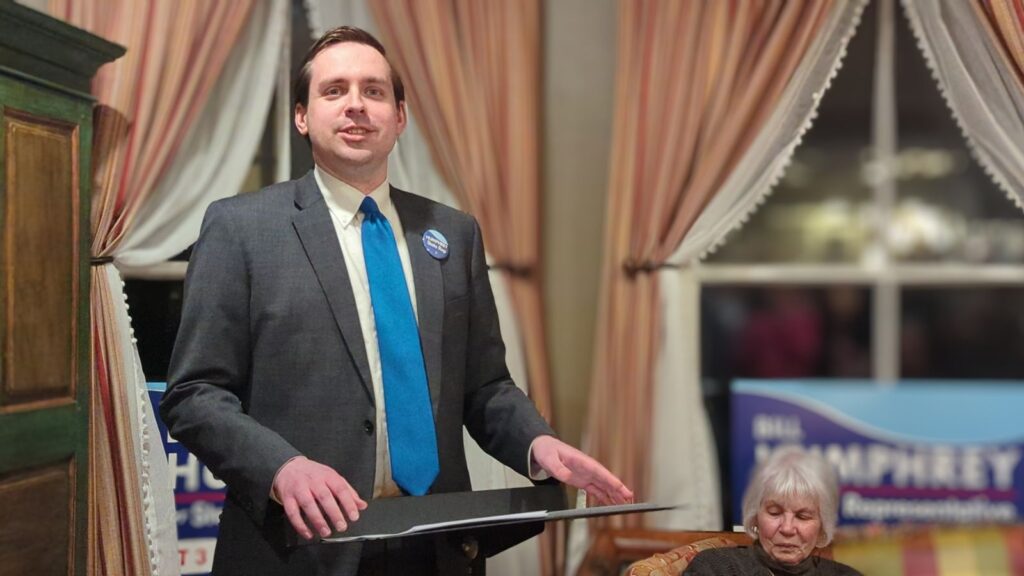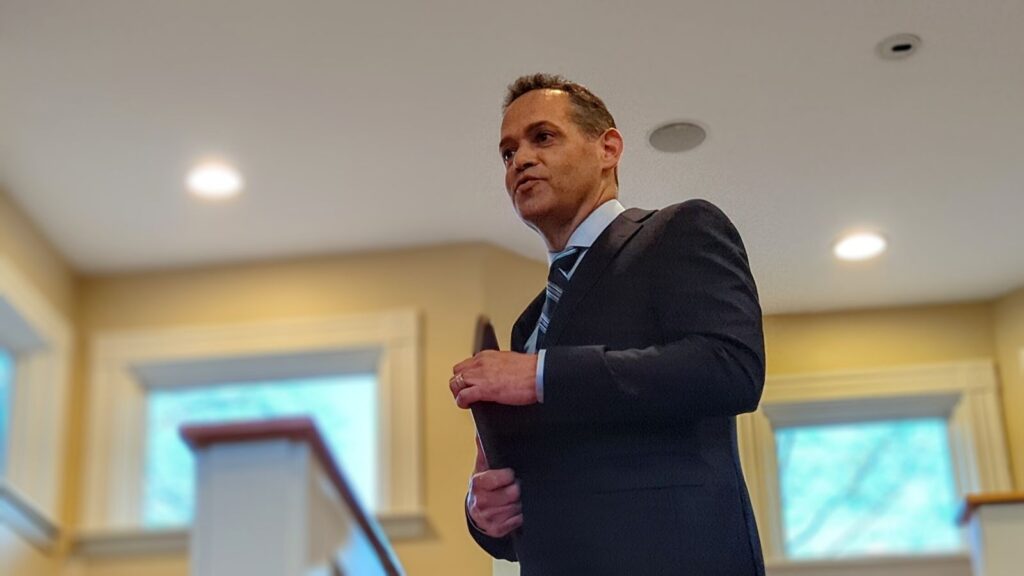Engine 6 had the five candidates for Newton’s two state representative seats at its meeting Wednesday night to talk about housing.
City Councilors Bill Humphrey and Rick Lipof and former City Councilor Greg Schwartz are running in the Democratic primary for the Middlesex 12th seat. Former City Councilor Amy Sangiolo is running in the Democratic primary for the Middlesex 11th seat against political newcomer Alex Jablon, who works in finance auditing.
There are no Republican candidates yet for either seat.
The Engine 6 meeting, held on Zoom, lasted nearly two hours and covered three main topics: Real estate transfer fees, state zoning law and ways each candidate would promote increased housing if elected to the legislature.
Here are just a few of the highlights.
Real estate transfer fees
Massachusetts has a real estate transfer tax of $2.28 per $500 in value. Typically the seller pays it, but that can be negotiated in a sale.
There’s provision in a bill in the legislature, the Affordable Homes Act, that would allow cities and towns to charge a local real estate transfer fee between .5 percent and 2 percent on real estate transactions totaling more than $1 million (or the value of the median home price in that county, whichever is higher).
Humphrey said he’s “very passionate supporter of real estate transfer fees” and said the fees would be minor and could raise a lot of funds for legislative initiatives addressing the housing crisis in Newton and statewide.

“This gives us the opportunity to raise a huge amount of money to fund the Affordable Housing Trust, which we finally created,” Humphrey said. “They’re doing good work there but they need additional funding to really unlock their potential, and the transfer fee on all real estate that would go to affordable housing is an essential piece to that.”
Lipof said he would support the move to allow real estate transfer fees but wants a clearer picture of what percentage to set it at, because home sales already come with costs.
“Everybody needs to understand that right now when you sell your house, on the entire amount you’re paying $4.56 per $1,000 already. That’s the current transfer tax,” Lipof said, adding that the “millionaire tax’ the state implemented last year is also part of the cost of selling many homes in the area. “These are the taxes that we’re incurring, and you have to be very careful that you don’t tax out the entire industry.”
Lipof said he wants any law allowing a local transfer fee to have the fee set at a low amount.
The Fair Share Amendment (the “millionaire tax”), however, only applies to homes for which the value increased by more than $1 million, not for all homes that sell for more than $1 million.
Shwartz said he supports the idea to allow local transfer fees as “an important part of improving the affordable housing funds that are available to cities and towns to build more affordable housing.”
Like Lipof, Schwartz said he’s open to debate about the allowable amount of such a transfer fee.
Sangiolo also supports the idea of transfer fees but said “the devil is going to be in the details,” pointing out that most Newton home sales are for more than $1 million.
“So the city is going to have to decide at what price point they will seek an exemption and who would pay for that transfer tax,” Sangiolo said.
And lastly, Jablon said it’s the perfect time to talk about transfer fees, now that a settlement has dropped realtor commissions, and the money from transfer fees can help the city even the housing playing field.
“It’s something that we can use to fund more affordable housing projects, and because it’s municipal, it would be free from dependency on the state or the federal government,” Jablon said.
The triple-deckers and ADUs
Once a common sight across New England, triple-decker houses became popular in the late 19th century as more and more immigrant families arrived in New England in need of homes.
As transit lines grew and more of those immigrant families moved to the suburbs, the suburbs pushed back. A 1912 state law allowed communities to ban triple-deckers, and many suburbs did.
A lot has changed since 1912, including the housing supply in the suburbs. So there’s a push in many communities to repeal that law and make communities allow the classic New England triple-decker again.
At Wednesday night’s meeting, Humphrey brought up triple-deckers as a way to increase housing supply. Newton currently has no areas that are zoned for triple-deckers by-right (without a special permit).
“That’s an iconic form of architecture in Massachusetts that would blend in with any neighborhood in our community,” Humphrey said.
Jablon, whose grandfather grew up in a triple-decker in Dorchester, also said he’d try to bring triple-deckers back statewide.
“It’s a quintessential part of Massachusetts, but even apart from cultural aspect, we really do need more of this type of housing,” Jablon said.
Humphrey also said he would support a statewide law allowing accessory dwelling units by-right in every community.
Schwartz also cited the push for a statewide ADU by-right law as something he supports, as part of a broader plan to add more diverse housing to the region.

“We at the state level can encourage that, whether it’s tax benefits or public/private partnerships, to improve the production of middle-income housing, so that children who grew up in Newton and Brookline, the firefighters and the teachers, folks in that middle who are being squeezed out of the market because of private developers’ focus on building high-end housing, is certainly in our interest,” Schwartz said.
Jablon noted that allowing ADUs and triple-deckers is a land use issue as well, in a state with a lot of people but very little land.
“Any way that we can make the most of the land that we have, I’m absolutely in support of,” Jablon said.
40B ‘problematic’
Sangiolo, an attorney who works in the Massachusetts Attorney General’s Office, was asked about her thoughts on Chapter 40B, a law that allows developers to bypass certain zoning steps if their proposed development has 10 percent or more units priced below market price.
Newton recently reached Safe Harbor status for the first time, meaning the city has added the number of “affordable” homes set by Chapter 40B. But there’s a catch.

“All the units within a 40B project are counted toward our subsidized inventory, so in reality we don’t have that many affordable housing units produced under the 40B legislation, and I find that problematic,” she said.
Sangiolo said she would like to see the state push more housing units priced at 50 percent of the area median home price or below, rather than the 80 percent the law currently requires.
Overcoming fear, finding hope
Lipof said that when he was promoting the Village Center Overlay District, he ran into a lot of fear. And he wants to tackle that fear of housing as a state legislator.
“A few sowed the fear of the number of units that could be created, and fear is so much easier to grab onto if you don’t know the whole story,” Lipof said. “And it took on a life of its own.”
“As a real estate guy I know, it would take a hundred years for this city to look substantially different,” he added.
As chair of the City Council’s Land Use Committee, Lipof has had to work with developers on addressing residents’ fears, and he said those fears are typically unwarranted.

“The fear of what those projects were going to bring was so much more than the reality of the traffic that they did,” Lipof said.
When it comes to hope, Jablon, age 28, spoke about what he wants for his kids, who don’t yet exist but already have a tough housing situation waiting for them.
“I want my kids to be able to grow up in the city that I love so much,” Jablon said. “And that dream is becoming less and less attainable for people my age.”
Jablon said he’s spoken with a lot of parents who are worried their kids won’t be able to live in Massachusetts when they grow up.
“I really think that the time to act is now,” he said.
The entire discussion is on Vimeo.
The Democratic primary is set for Sept. 3.